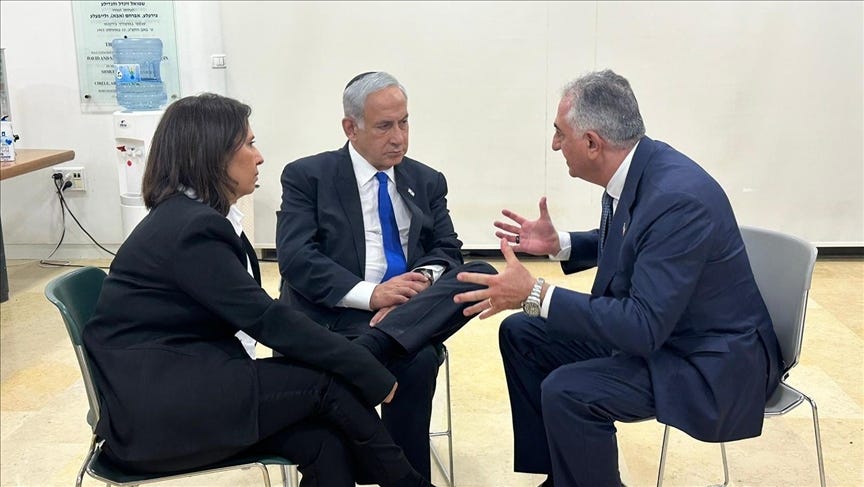Trump doesn't think the US can run Iran. Does he think Israel can?
While Israel has made clear the war on Iran is far from over, regime change is not on their agenda – regime collapse is. And it will be the U.S. that is on the hook to clean up.
When Donald Trump was asked in the 2024 campaign if the U.S. would pursue regime change on Iran, he waved it off.
"We can't get totally involved in all that. We can't run ourselves, let's face it."
Instead, he consistently indicated he did not want a war and favored a diplomatic resolution.
Of course, after Netanyahu launched a surprise attack on Iran in the midst of Trump's nuclear talks with Iran in June, he became the first U.S. president since Jimmy Carter to authorize direct U.S. military action in Iran in June – a reversal from his campaign pledges and past hesitations. Israel started the war with Iran but needed the U.S. to finish it. And all indications are Israel is not done – and the U.S. will be pulled in again, becoming "totally involved" in whatever designs Netanyahu ultimately has for Iran.
While Trump's interest in full-scale Bush-Cheney-style regime change on Iran appears to remain low, the Israelis are singing a much different tune.
Yesterday, Israeli president Isaac Herzog and the Science Minister Gila Gamliel hosted a "team of experts" working on behalf of the son of the deposed Shah, Reza Pahlavi, on a "transition plan" for Iran.

Even as Israel is increasingly isolated as more experts and states declare its slaughter of Palestinians a genocide, figures like Pahlavi are keen on Israel “liberating” Iranians — by bombing them too. Famously, Pahlavi refused to criticize Israel's war on Iran that killed hundreds of Iranian civilians. "I don't think it was the intention of the Israeli government to attack civilians," he has said, even as Amnesty International and Human Rights Watch say Israel likely committed war crimes on Iranians.
The Pahlavists know better than to bite the hand that feeds them – as Intelligence Minister, Gamliel orchestrated an online influence campaign to bolster Pahlavi during the Women, Life, Freedom movement, vilifying and marginalizing other Iranian voices and bringing him renewed prominence, at least among the Iranian diaspora. Unsurprisingly, the second step in the Pahlavi "transition plan" is to recognize Israel.
Collapse, Not Change
But is Israel's open support for Iran's would-be king a signal that it truly seeks a regime change war to replace the Islamic Republic with a Pahlavi regime?
During the June war, Israeli officials inferred – and Defense Minister Israel Katz openly stated — that removing the regime is necessary to realize Israel's strategic objectives. But while these officials have also made clear the war on Iran is far from over, regime change is likely not on the Israeli agenda. Regime collapse is. And, as with the June war, it will likely be the U.S. that is on the hook to clean up the mess.
Based on Israel's reported attempts at regime decapitation during its 12-day war, including an attack that nearly killed Iran's President and members of the National Security Council, the aim appears not to be to replace the Islamic Republic with a friendlier government but to collapse the state entirely – and ensure it cannot emerge as a rival to Israel. While the Israelis have boosted figures like Pahlavi and coordinated with the MEK and other extremist groups, these are low cost measures that spread Israel’s bets and keep any independent Iranian opposition movement leaderless – not investments in serious governing alternatives.
If Israel breaks it, the U.S. buys it.
Implementing a plan to actually remove a regime and facilitate a democratic transition – or install a new leader – would be an immensely costly and fraught commitment for Israel. But the Pottery Barn rule works differently for Israel. If they break it, the U.S. buys it. If Israel's plan is ultimately to collapse Iran and turn it into a failed state with symbolic support for "transition plans", it will be the U.S., not Israel, that will assume the costs of the ensuing refugee crises, extremist sanctuaries, economic collapse, and endless military commitments.
Israel has been allowed to set the agenda for American foreign policy in the Middle East by successive administrations, with the U.S. providing unconditional military and diplomatic support even as Israel undertakes steps against stated U.S. policy preferences. When Netanyahu decided to start a war with Iran (aimed as much at neutralizing Trump's Iran diplomacy as neutralizing Iran's nuclear program), the U.S. was on the hook to finish it as American interceptor systems were staggeringly depleted.
Unless Trump makes explicit that the 12-day war was just that, the U.S. risks signing up for a regime change installment plan.
Trump may not want to get involved in a major war or militarized regime change, but he is being led directly down that path. The U.S. cannot continue to be passive observers as Israel calls the shots until it’s time to bail out Israel after its bad decisions. Unless Trump now believes that the U.S. should be in the business of regime change wars and nation building, he must make explicit to Israel that the 12-day war was just that, and the U.S. did not sign up for the regime change installment plan.



